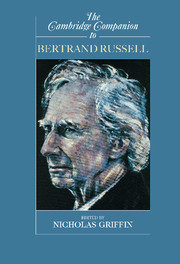Book contents
- Frontmatter
- Introduction
- 1 Mathematics in and behind Russell’s Logicism, and Its Reception
- 2 Russell’s Philosophical Background
- 3 Russell and Moore, 1898-1905
- 4 Russell and Frege
- 5 Bertrand Russell’s Logicism
- 6 The Theory of Descriptions
- 7 Russell’s Substitutional Theory
- 8 The Theory of Types
- 9 Russell’s Method of Analysis
- 10 Russell’s Neutral Monism
- 11 The Metaphysics of Logical Atomism
- 12 Russell’s Structuralism and the Absolute Description of the World
- 13 From Knowledge by Acquaintance to Knowledge by Causation
- 14 Russell, Experience, and the Roots of Science
- 15 Bertrand Russell
- Selective Bibliography
- Index
- Series list
12 - Russell’s Structuralism and the Absolute Description of the World
Published online by Cambridge University Press: 28 May 2006
- Frontmatter
- Introduction
- 1 Mathematics in and behind Russell’s Logicism, and Its Reception
- 2 Russell’s Philosophical Background
- 3 Russell and Moore, 1898-1905
- 4 Russell and Frege
- 5 Bertrand Russell’s Logicism
- 6 The Theory of Descriptions
- 7 Russell’s Substitutional Theory
- 8 The Theory of Types
- 9 Russell’s Method of Analysis
- 10 Russell’s Neutral Monism
- 11 The Metaphysics of Logical Atomism
- 12 Russell’s Structuralism and the Absolute Description of the World
- 13 From Knowledge by Acquaintance to Knowledge by Causation
- 14 Russell, Experience, and the Roots of Science
- 15 Bertrand Russell
- Selective Bibliography
- Index
- Series list
Summary
There are three major ideas arising from Russell's work in logic and philosophy of mathematics which he believed to be of philosophical importance for the theory of our knowledge of the physical world. The first was his theory of descriptions; the second, the concept of structure; and the third, the notion of a logical construction. The use of logical constructions in theory of knowledge was most prominent during Russell's phenomenalist period, the period which culminated with Knowledge of the External World. This phase of Russell's thought falls outside the purview of the present work. Logical constructions play an important - but very different - role in his subsequent realism, where they occur mainly in connection with the “interpretation” of the theory of space-time, and where they subserve both metaphysical and epistemological goals. Although we will have occasion to refer to this application of logical constructions toward the very end of the essay, considerations of space prevent us from exploring their use in any detail. Our focus here will be on the second of these ideas - the concept of structure - and the development of Russell's “structuralism.” But before turning to this topic, it will be worthwhile to sketch Russell’s application of his theory of descriptions to theory of knowledge; this application and his structuralism are often discussed together with the result that they are not always as sharply distinguished from one another as they should be.
- Type
- Chapter
- Information
- The Cambridge Companion to Bertrand Russell , pp. 392 - 419Publisher: Cambridge University PressPrint publication year: 2003
- 4
- Cited by



